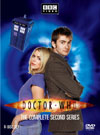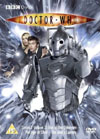DVD Extras (box sets only) include:
Next nit: Is there any good reason for not showing the TARDIS materializing in this story? David Tennant's first six stories all skimped on this effect, and now here we make it seven, even while the Doctor & Rose's first scene just begs for a good police box landing. Not off to a great start at all. Yes, yet another nit: Why isn't Mickey Smith in this one? From someone who was hoping that he would outlast Rose in the TARDIS, his absence is a great source of disappointment. Russell T. Davies asserts in the "Confidential" featurette that from here to the end of the season, it's just the Doctor and Rose together against the odds, and he asserts this proudly. He should be embarrassed. Noel Clarke's performance as Mickey is so enjoyable - he and David Tennant could have been as strong a pairing as Patrick Troughton and Frazer Hines. Billie Piper's performance as Rose is good, but Rose's character, looks, and nebulous relationship with the Doctor just aren't much of a draw for me. And, knowing that Piper had chosen to move on to other work at the end of this season, I began to look forward to her replacement. Too bad it looked like it wouldn't be Mickey after all. Next point of confusion: Does the story intend to promote TV-less living? Many scenes seem poised to do so, driving home the message with some choice dialogue and a few almost clever sci-fi metaphors. But the tale also seems to want to defend television, suggested by some low-key off-hand remarks by the hero of the series. Listen carefully or you may miss them. Which side is the writer on? It's vastly unclear by the time the adventure ends, and neither does it feel like it's made any significant contribution to the debate. One problem is the medium of the adventure itself. It's an episode of a hit TV show. Arguing against TV successfully here would be like shooting yourself in the foot. If you can convince people to go TV-less, you'll be whittling away your audience, your ratings, and ultimately your funding. And it's not as if this show promotes an alternative that its creators are poised to cash in on. Arguing against TV is for novels or newspapers or internet, or radio, or at the least a one-off TV documentary or satire. In a continuing series, it can only be done by people not prepared to walk their talk. Ever hear of hypocrisy? Another problem is the sci-fi mechanism that forms the basis for the story - it's too ridiculously unbelievable to entertain an audience as anything other than a metaphor promoting giving up TV. Mark Gatiss, Russell T. Davies, and Julie Gardner all love their TV too much to be serious about the metaphor, as Davies in particular proved in Bad Wolf (story no. 170). As a sci-fi concept in and of itself, it's pretty ridiculous. Believability is out the window here, and the adventure falls flat. The main thrust of this story feels like self-indulgence, which seems to be becoming a Mark Gatiss trademark. It's most notable for a sequence in the Connelly home, where Tommy so easily represents a bright young Doctor Who fan being repressed by a stern father, a young fan who wishes the Doctor would come to his house and use his heroic nature to tell Dad off and put him in his place. Not that Tommy had seen Doctor Who or any other TV show at that point, but the parallels seem obvious. And so Gatiss indulges, and "Tommy's wish" comes true. On the one hand, the idea is so saturated with sickly-sweet fan fantasy that one fully expects the scene to be a disaster. But on the other, the dialogue itself somehow finds a way to take a somewhat tasteful route through this, and David Tennant and his fellow actors nail the scene and make it hugely entertaining and moving. Perhaps just this once, the risk of self-indulgence was worth taking. One definite improvement Gatiss has made over his script from the previous year is to give the Doctor a truly heroic finish. Nice one. However, adding to the lack of believability is the magic wand fix-all nature of the results. Oh well. Not great, but at least better than "The Unquiet Dead" (story no. 163) by a decent margin. Musically, nothing much stands out until the final cue comes along, when Murray Gold comes up with a mellow, happy-go-lucky piece for calmly celebrating good times - which will recur again near the beginning of the season finale. The final scene is interesting, because Tommy's over-zealousness becomes palpable and just when you think Gatiss may have gone overboard distastefully, Rose reins Tommy in with a brilliant display of graceful diplomacy and the story ends on a note of healthier relationships winning the day. Good one.
International Titles:Deutsch: "Die Glotze"Magyar: "A bolond lámpása"Français: "L'Hystérique de l'étrange lucarne"Русский: "Фонарь идиота"Italiano: "La Trasmittente"This story has become available on DVD. Click on the Amazon symbol for the location nearest you for pricing and availability:
Note: The full season sets contain commentaries, behind-the-scenes featurettes, and other extras. The smaller volumes only feature the plain episodes. Comments on this article are welcome. You may contact the author from this page:
|








